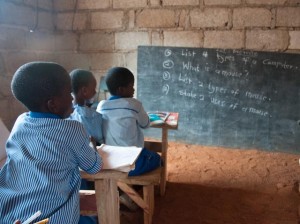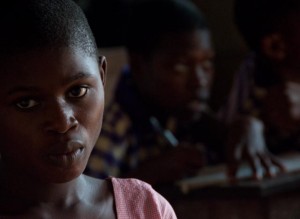Spotlight on Educational Microfinance & IDP Rising Schools: Students of the World (SOW) Meets Students & Educators in Ghana
The Students of the World (SOW) Boston team is in Ghana all this month visiting Opportunity Ghana‘s microfinance operations and documenting their experiences in a diverse array of photos, posts and more on their blog. You can see all their updates and content on their site, and stay tuned to the Opportunity Blog and our Facebook page for updates from their trip. The following post was co-written by SOW with their Assistant Filmmaker Sarah Stein Lubrano.
 After arriving in a very lush Kumasi by bus, we settled into our guesthouse and prepared for our next set of interviews. We’re filming the schools involved in the IDP Rising Schools Program, an initiative created and implemented by the IDP Foundation, Inc., Opportunity International, and Sinapi Aba Trust (SAT). SAT, a member of the Opportunity International network, is an NGO in Ghana that offers microfinance services to clients, including loans to school proprietors to fund the building of quality local private schools. After 12 weeks of management training for school proprietors, and training for school caterers on sanitation, nutrition, and safety, the schools are given loans to improve their infrastructure and human resources. Today we visited two of those schools: Christ is the Answer Preparatory School and Romesco International School.
After arriving in a very lush Kumasi by bus, we settled into our guesthouse and prepared for our next set of interviews. We’re filming the schools involved in the IDP Rising Schools Program, an initiative created and implemented by the IDP Foundation, Inc., Opportunity International, and Sinapi Aba Trust (SAT). SAT, a member of the Opportunity International network, is an NGO in Ghana that offers microfinance services to clients, including loans to school proprietors to fund the building of quality local private schools. After 12 weeks of management training for school proprietors, and training for school caterers on sanitation, nutrition, and safety, the schools are given loans to improve their infrastructure and human resources. Today we visited two of those schools: Christ is the Answer Preparatory School and Romesco International School.
Anthony Kwasi Nyarku, a retired schoolteacher, founded Christ is the Answer Preparatory School in 1997. After retiring to his home village in Adansi-Dompoase, his wife encouraged him to found a school. He resisted—until he had a dream in which his brother showed him the plot of land on which Christ is the Answer would eventually be built. Anthony took this as a sign and began. His school started with four students and now serves about 180 students. In February 2010, SAT contacted him through a recommendation by Romesco International School, interviewed him, and eventually chose him for their loan program. Through the program, he learned to manage his money, keeping separate accounts for the school’s money and his own, saving and keeping track of petty cash.
We discussed with Anthony why he felt his school was an important addition to Ghana’s educational system. He explained that government schools often are undersupervised and a strong union protects the sometimes-neglectful teachers. His teachers, however, are closely overseen. Additionally, Christ is the Answer Preparatory School is able to provide this education to some students who cannot afford “even the uniform.” As a result of the hard work of Anthony, his teachers and his students, all 11 students who took last year’s Basic Education Certificate Examination (BECE)–a required exam for any student wishing to go on to Senior High School–passed them, and received the third-highest scores in the area.
 Our second visit was to Romesco International School, founded in 2002 by Richard Danso Smith, formerly a schoolteacher in another nearby school. Originally, it was Ebenezer International School until he bought it. Richard started out with one wooden building without cement or mortar. Today he has 400 students and four buildings circling a vast field. The buildings are now firm structures, but the floors still require cement. Romesco International School has classes from Kindergarten to Junior High School Year 3. They received a loan in 2009, after Richard was looking for a reliable loan source to fix his school’s infrastructure. Richard too went through proprietor training and like Anthony he felt that the most helpful part was learning how to manage his accounts. He learned how to separate his private expenses from the school’s and how to always keep a petty cash ledger. He also felt that by keeping track of daily expenses, he was able to manage his teachers well and provide incentives to them.
Our second visit was to Romesco International School, founded in 2002 by Richard Danso Smith, formerly a schoolteacher in another nearby school. Originally, it was Ebenezer International School until he bought it. Richard started out with one wooden building without cement or mortar. Today he has 400 students and four buildings circling a vast field. The buildings are now firm structures, but the floors still require cement. Romesco International School has classes from Kindergarten to Junior High School Year 3. They received a loan in 2009, after Richard was looking for a reliable loan source to fix his school’s infrastructure. Richard too went through proprietor training and like Anthony he felt that the most helpful part was learning how to manage his accounts. He learned how to separate his private expenses from the school’s and how to always keep a petty cash ledger. He also felt that by keeping track of daily expenses, he was able to manage his teachers well and provide incentives to them.
Richard maintained that diligent monitoring of his teachers was the most important reason why private schools like his are effective. Through close supervision and using his teaching experience to train them to use interesting and engaging teaching techniques, Richard ensured that the academic standards remained consistently high. The students, he said, had been doing extremely well in the BECE, and his school’s results had ranked fifth in the district for the past few years. He also encouraged his students to have fun. Inter-house quizzes, football and netball matches seemed to be regular fixtures in this school. Serafina Asantewaa, a JHS third form student spoke to us excitedly about helping her house win the last quiz. After only a few years, the school seemed to have grown remarkably, but it still needs many improvements in its infrastructure. Both Anthony and Richard want to take advantage of computers and libraries, and plan on using their loans to do so. As we move into proprietor training sessions tomorrow, we will see exactly how SAT helps Richard and Anthony plan out the futures of their schools.
To read the post on the SOW Boston blog, click here. To read SOW’s followup blog on the proprietor training sessions, click here. Would you like to see Opportunity Ghana‘s educational microfinance programs firsthand? Travel with us in October on our Insight Trip to Ghana.